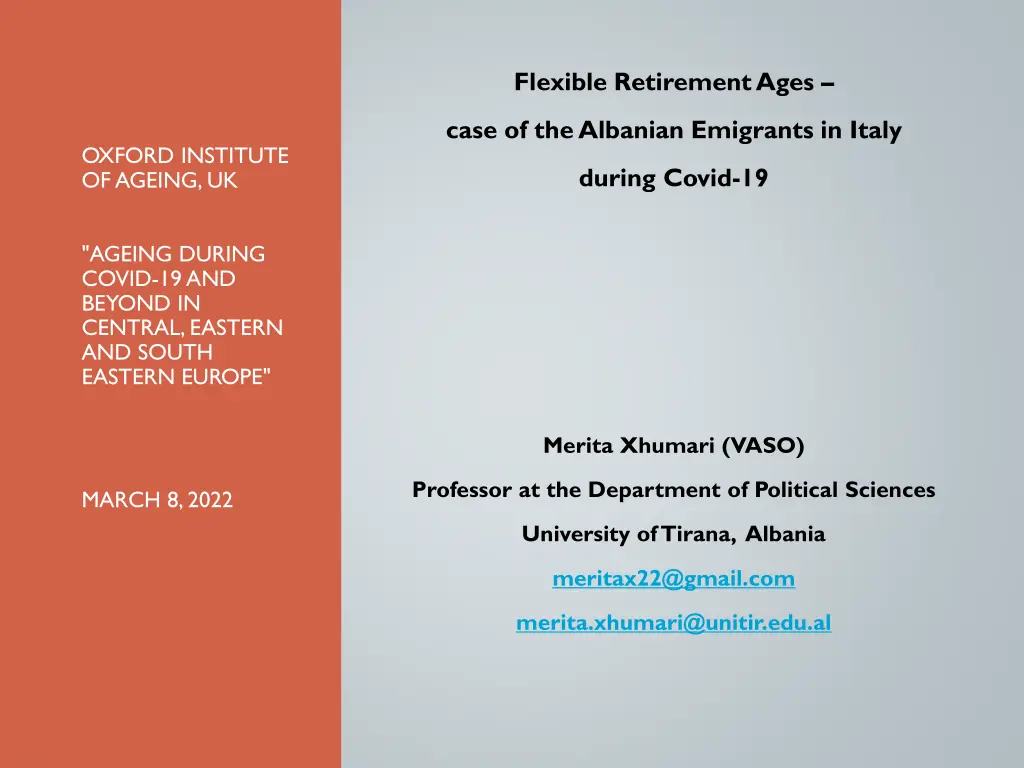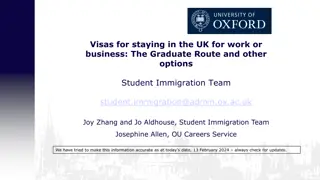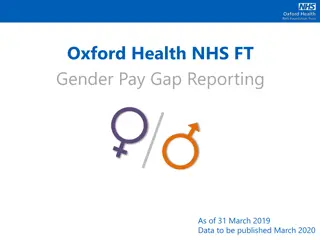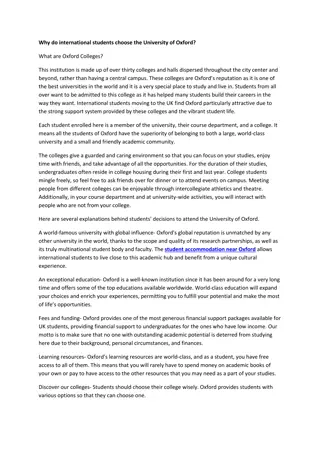
Impact of Covid-19 on Albanian Emigrants in Italy
Explore the impact of Covid-19 on Albanian emigrants in Italy, focusing on flexibility in retirement ages, social insurance, and bilateral agreements for pensions. Discover how the pandemic has affected employment, remittances, and government aid packages for emigrants.
Download Presentation

Please find below an Image/Link to download the presentation.
The content on the website is provided AS IS for your information and personal use only. It may not be sold, licensed, or shared on other websites without obtaining consent from the author. If you encounter any issues during the download, it is possible that the publisher has removed the file from their server.
You are allowed to download the files provided on this website for personal or commercial use, subject to the condition that they are used lawfully. All files are the property of their respective owners.
The content on the website is provided AS IS for your information and personal use only. It may not be sold, licensed, or shared on other websites without obtaining consent from the author.
E N D
Presentation Transcript
Flexible Retirement Ages case of the Albanian Emigrants in Italy OXFORD INSTITUTE OF AGEING, UK during Covid-19 "AGEING DURING COVID-19 AND BEYOND IN CENTRAL, EASTERN AND SOUTH EASTERN EUROPE" Merita Xhumari (VASO) Professor at the Department of Political Sciences MARCH 8, 2022 University of Tirana, Albania meritax22@gmail.com merita.xhumari@unitir.edu.al
The impact of Covid-19 in Albania The impact of Covid-19 to the Emigrants CONTENTS Flexibility in retirement ages to the labour market and to the individuals situations The case of Albanian older emigrant workers in Italy Impact of migration on ageing, employment and pensions in Albania Social insurance in Albania to guarantee the old age pension of emigrants Evolution of the Voluntary Social Insurance The Bilateral Agreements for Pensions of Emigrants The EU Conditionality to Albania Discussions on Flexibility in retirement ages
The quarantine in Albania - closure of the most economic activities and schools March 9 June, 2020 The pandemic first wave peak in April 2020, then at one second highest wave in November 2020, then culminating in February 2021, which was followed by a stable situation THE IMPACT OF COVID-19 IN ALBANIA The highest incidence of affected cases is in the age group 55-64 years with about 20% of confirmed cases https://shendetsia.gov.al/ Impact on employment: dismissals, unpaid leave, reduced working hours at 4-hour contracts, or with only 2 weeks per month, extended shifts or extra workload for several sectors such as education, health, etc...
The Covid-19 pandemic has made it difficult especially for migrants, and among them especially those in the upper age groups, to cope with labour market changes. THE IMPACT OF COVID-19 TO THE EMIGRANTS Government aid packages to address health threats during Covid-19 and job losses are not available to many emigrants. This is even more problematic for people with irregular residence status in destination countries. Loss of jobs and income because of Covid-19 is causing a decline in remittances to their families which are a vital source of income and serve as a form of insurance in times of crisis for many families (Repetti et al., 2021).
The Italian government has avoiding standard retirement ages with Quota 100 initiative, which means that Italian citizens who reach 100 by adding their years of insurance contributions to their biological age, are eligible for old age pension. Flexibility in retirement ages to the labour market and to the individuals situations In this way, a 62-year-old person who has contributed 38 years of the insurance scores 100, is eligible for a pension even though the legal retirement age is 67 years. In addition, the Italian women who have 40 years of the insurance contributions are eligible for an old-age pension without waiting to reach the retirement age of 67. Older Albanian emigrants with Italian citizenship, protested in August 2021 as they feel discriminated from this rights. Albanian emigrants in the best cases they may have a maximum of 30 years of insurance period in Italy, from 1991 to 2021, but they have more than 40 years of insurance in their working life. Due to a lack of bilateral agreements between the two countries there are no aggregation of insurance periods and no pension rights.
The Albanian emigrants in Italy if have completed a 19-year insurance period in the Italian social security system they cannot receive a contributory pension as the criterion is of 20 years minimum of social insurance. ALBANIAN EMIGRANT PENSION RIGHTS IN ITALY While in the Albanian social security system, the minimum eligibility criterion is 15 years social insurance. The bilateral agreement between the Albanian and Italian governments would enable mutual recognition and aggregation of the periods of insurance. At the end of aggregation of both insurance periods, let say 14+19= 33 years, which would enouble any emigrant to receive an old- age pension in Albania as well as in Italy, following a pro rata formula of calculating the pension.
About 1/3 of the Albanians has emigrated abroad, mainly in Italy (40%) and Greece (36%) Prevalence of age-groups: Female: 0-14 years - 19% 15-64 years - 76% 799,416 Male: 65+ years - 5% 884,719 Impact of Migration on About one third of the stock of migrants are aged between 40 and 65, approaching retirement age and raises the issue of pensions. ageing, employment and pensions in Albania Emigration increased the old age dependency ratio in Albania to one older person for 5 in active age, which will be 1:3 in 2031 Since 1993, the dependency ratio of social insurance system is critical 1:1, 1 pensioner is supported by 1 contributor. Remittances accounted for about 28% of GDP in 1993 was declined to about 8% of GDP in 2020. The uncontrolled migration distorted labour market and enabled informality, undeclared employment and real wage Informality and unpaid family work were widespread in agriculture (50%), among older women and young men.
In 1990s, early retirement was the first instrument for social protection of unemployed older workers of age-group 5 years before retirement ages, which varied 45 - 65 years old Albanian Social Insurance guarantee the pensions right of emigrants I. In 1993 started the reformation of Social Insurance system with: Compulsory social insurance with a new unemployment social insurance scheme; and Voluntary social insurance as a complementary to the compulsory one which open the door for Albanian emigrants to continue their social insurance. II. After 10 years in 2003-2005, the Albanian public voluntary social insurance was applied to the Albanian emigrants in Greece. III. 10 years later, in 2015 the policy priorities have been intensification of bilateral agreements for social insurance of Albanian emigrants.
Voluntary social insurance 1995-2002 It offers emigrants the opportunity to continue their social insurance interrupted when they leave Albania, to gain the social rights acquired by their previous contributions. It was responded to the emigrants needs in the first period of migration were majority of them were engaged in informal economic activities. The decreased number from 2,869 in 2001 into 2,174 in 2002 prompted the government to develop a new proactive approach.
Application of voluntary social insurance in Greece, 2003 In 2003, the Social Insurance Institute decided to contact emigrants in their host countries choosing the Greece, destination of about half of the Albanian emigrants. The American Bank of Albania, which opened a branch in Athens was contracted to collect contributions to the voluntary social insurance scheme from Albanian emigrants. The bank employees were young Albanian emigrants graduated from Greek universities who attracted their co- nationals to pay contributions to the Albanian social insurance system. In 2003, the number of emigrants insured in the voluntary scheme reached 2,712 persons, approximately the same as the all the Albanian domestic and emigrants insured in 2001, the highest level. Approaching them in their own place and explaining the benefits for which they have are familiar now from their insurance to the Greek social insurance, was the best way to their social protection.
During the first 15 years, 1990-2005, the group age 50+ of emigrants have higher interest to be insured in the voluntary social insurance: Reflect their fragile situation on a secure employment; The EU Conditionality Policy to Albania Their dilemmas on staying permanently at the destination countries; Have a considerable pre-emigration insurance period in Albania. Law of 2006 "On the emigration of Albanian citizens for employment reasons formalization of the emigration- however, the pension rights that derive from employment remain on shadow. Today, the emigrants need security in this critical global situation of pandemic Covid-19 and whatever it will be in the future. The process of integration of Albania and the evolution of the Albanian emigrants status as European citizens, impose new policies The emigrants efforts for working and giving their contribution to social integration do not have the same reciprocity from the efforts at the government levels and EU conditionality policy to Albania.
The intensification of bilateral agreements between Albania and the emigrants host countries was concluded with: 2016 - Belgium, Hungary, Luxembourg, North Macedonia, The Bilateral Agreements for Pensions of Emigrants 2017 - Czech Republic, Germany, Austria (2018), while other agreements are being under negotiations with Italy, Greece, etc.. Special rules are set by the EU for coordination of national social security systems to ensure that migrants within the EU and their dependents and survivors retain their accumulated rights and benefits by combining their work history in each country (EC Regulation No.883 / 2004). In the case of agreements between countries, the insurance period in one state cannot overlap with the same social insurance period in the other country. The emigrants should be aware on such rules, to avoid double insurance period, in the context of bilateral agreements between Albania and the EU countries.
1. Should the EU member states respect the right for a pension to the legal emigrants, who currently are EU Citizen similarly to the other EU citizens who enjoy freedom of movement, employment and retirement? Open Discussions 2. What about the experiences in your countries regarding flexible retirement ages like Quota 100 in Italy? THANKS YOU! 3. Should a pensioner, who receive an old age pension and continue working, has to continue pay contributions if the amount of pension is not recalculated???






















